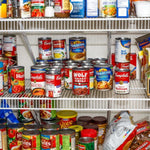Samantha Daly
Storing a Safe Water Supply
A shocking number of Americans don’t have enough non-perishable food and water to sustain themselves in an emergency. Any good prepper knows that the single most valuable resource to have access to when SHTF is clean drinking water. Therefore, it is vital that you have a stockpile of water to drink until a clean water source can be secured or a process for boiling water put in place. But not only do you need a water storage container, you need to do it correctly or the drinking water can and will become toxic. Here are the simple mistakes to avoid when preparing water storage for emergencies.
How NOT to Store Water
- DO NOT store water in anything besides food grade plastic containers! You can tell if a container is food grade by looking at the plastic number in the triangular recycling symbol on the bottom of the container. Plastics 1, 2, 4, and 7 are food grade.
- DO NOT store in containers that have previously stored water or other foods. No matter how many times it has been washed, oils and bacteria remain in most used food containers.
- DO NOT store in metal containers that aren’t stainless steel. If it isn’t stainless steel, it will rust, polluting the water.
- DO NOT store in direct sunlight or heat. Sunlight and heat will cause chemicals to leach out of plastics and even sometimes glass. You want a shaded, temperature controlled room such as a basement or underground cellar.
Water Storage Methods
For many, when it comes to water storage, their first instinct is to go to the grocery store and buy as many packs of 12oz plastic bottled water that will fit in their garage. Don’t do this when storing water! Plastic leaches chemicals into water over time, especially when exposed to heat and/or sunlight, so avoid using these packs when prepping. This does not make water safe to drink if you are storing for long term. If this is the method you do go with, you should replace your stock every six months to avoid chemical exposure. If you want good, long-term storage methods and avoid drinking plastic water, keep reading.
Here are some better water treatment options for safely storing large quantities of water:
Glass Containers. Always sanitize glass before using it to store water and do not use glass that has been used to store other items. The disadvantage to using glass is that it is heavy and breaks easily; however, without damage it can last forever.
Stainless Steel Containers. This is one of the safest ways to store water, as there are no chemicals that can leach into the water. But, if you are using stainless steel, you need to ensure that the water you put inside is completely distilled (not tap water). Water containing chlorine will erode the coating on the steal causing the water to corrode. Make sure the stainless steel container you are using is food grade to increase shelf life.
65 Gallon Plastic Water Barrels. These large plastic barrels are one of the most reliable long term water storage containers. They take up a significant amount of space, but allow for you to store all of your water in one container. It is important to keep in mind that you need to store enough water for your family, which is typically one gallon a person per day.
Large Water Cisterns. Cisterns are big, expensive, and never move once in place. But if you have a water cistern installed, you’re going to be set on drinkable, usable water for a very long time, as they can hold up to tens of thousands of gallons.
It is important to remember that even perfectly stored water should be replaced once a year to decrease the likelihood of illness, as microscopic organisms are impossible to keep out. The amount of water you should have in storage at any given time depends on how much activity you will be doing, how many people you are providing for, local access to water, and local weather patterns. The right amount of drinking water for the survival scenario is something each prepper needs to determine per person.
How many ways do you know how to purify water? Check out our list of ways to purify water.
How much emergency water do you have in reserve for an emergency? Where would you store your supply of water? Share your advice with other Battlboxers in the Members Only Facebook Page.
Share on:









